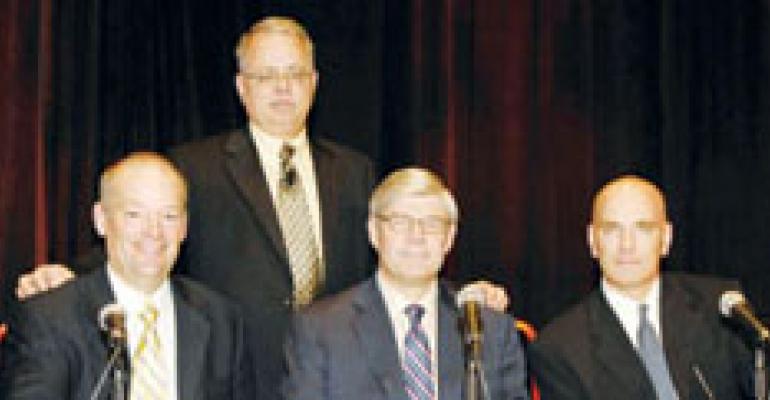ORLANDO Fla. —The development of information technology-enhanced kitchen equipment, or so-called “smart” devices, is being slowed by operator uncertainty about what they want from the marriage, manufacturing executives said.
Participating in the FS/TEC 2009 panel, “View from the Top: Equipment Manufacturers Look Toward the Future,” were Rick Caron, chief technology officer of Manitowoc Foodservice; John McDonough, president of ITW Food Equipment Group-North America; and Mark Whalen, president of Electrolux Foodservice Equipment’s North American operations. —The development of information technology-enhanced kitchen equipment, or so-called “smart” devices, is being slowed by operator uncertainty about what they want from the marriage, manufacturing executives said.
The moderator was Richard Halter, chief technical architect for the Association of Retail Technology Standards, or ARTS. —The development of information technology-enhanced kitchen equipment, or so-called “smart” devices, is being slowed by operator uncertainty about what they want from the marriage, manufacturing executives said.
“We’re not a software company; we are not an IT company,” Caron said, suggesting that while suppliers are manufacturing equipment than can capture and share data, operators will have to develop the value-adding business applications for such devices. —The development of information technology-enhanced kitchen equipment, or so-called “smart” devices, is being slowed by operator uncertainty about what they want from the marriage, manufacturing executives said.
Restaurateurs can “lose sight” of the “business benefit” they want from technology, he said, adding, “If there was more clear understanding of those objectives from the beginning, I think the equipment manufacturers could be more efficient in meeting the goals.” —The development of information technology-enhanced kitchen equipment, or so-called “smart” devices, is being slowed by operator uncertainty about what they want from the marriage, manufacturing executives said.
“For us in the equipment business, the return on investment in technology is our biggest challenge,” Whalen said. —The development of information technology-enhanced kitchen equipment, or so-called “smart” devices, is being slowed by operator uncertainty about what they want from the marriage, manufacturing executives said.
He added that he’d like to discover how much of the market is really willing to pay for technology. —The development of information technology-enhanced kitchen equipment, or so-called “smart” devices, is being slowed by operator uncertainty about what they want from the marriage, manufacturing executives said.
“My personal observation is that it is a pretty thin band, unfortunately,” he said. —The development of information technology-enhanced kitchen equipment, or so-called “smart” devices, is being slowed by operator uncertainty about what they want from the marriage, manufacturing executives said.
The cost of some IT-enhanced equipment can be difficult to justify on an individual-item basis, but may deliver a good return on investment when combined with several such pieces to create a so-called “high-performance” or “intelligent” kitchen, the panelists concurred. Such a positive ROI can stem from more efficient use of space, reduced energy consumption, faster food preparation or speed of service, and enhanced product holding. —The development of information technology-enhanced kitchen equipment, or so-called “smart” devices, is being slowed by operator uncertainty about what they want from the marriage, manufacturing executives said.
McDonough said all the panelists’ firms, along with at least one other, can deliver such suites of integrated smart devices. But the supplier side is mostly populated by single-category manufacturers, he said, which begs the question: “How do we make this work in a very large, multivendor environment in the foodservice industry?” —The development of information technology-enhanced kitchen equipment, or so-called “smart” devices, is being slowed by operator uncertainty about what they want from the marriage, manufacturing executives said.
Smart equipment might best be used in a kitchen designed from the ground up by multidisciplined teams that include information technology professionals, Caron indicated. McDonough noted that when operator IT specialists are involved in initial smart-equipment specification work, “we’re finding ways to better define the value proposition.” —The development of information technology-enhanced kitchen equipment, or so-called “smart” devices, is being slowed by operator uncertainty about what they want from the marriage, manufacturing executives said.
The panelists agreed that smart equipment development would continue in an “evolutionary” manner. Whelan said such products, by virtue of remote monitoring capabilities and life cycle data collection, contribute to better equipment designs. —The development of information technology-enhanced kitchen equipment, or so-called “smart” devices, is being slowed by operator uncertainty about what they want from the marriage, manufacturing executives said.




